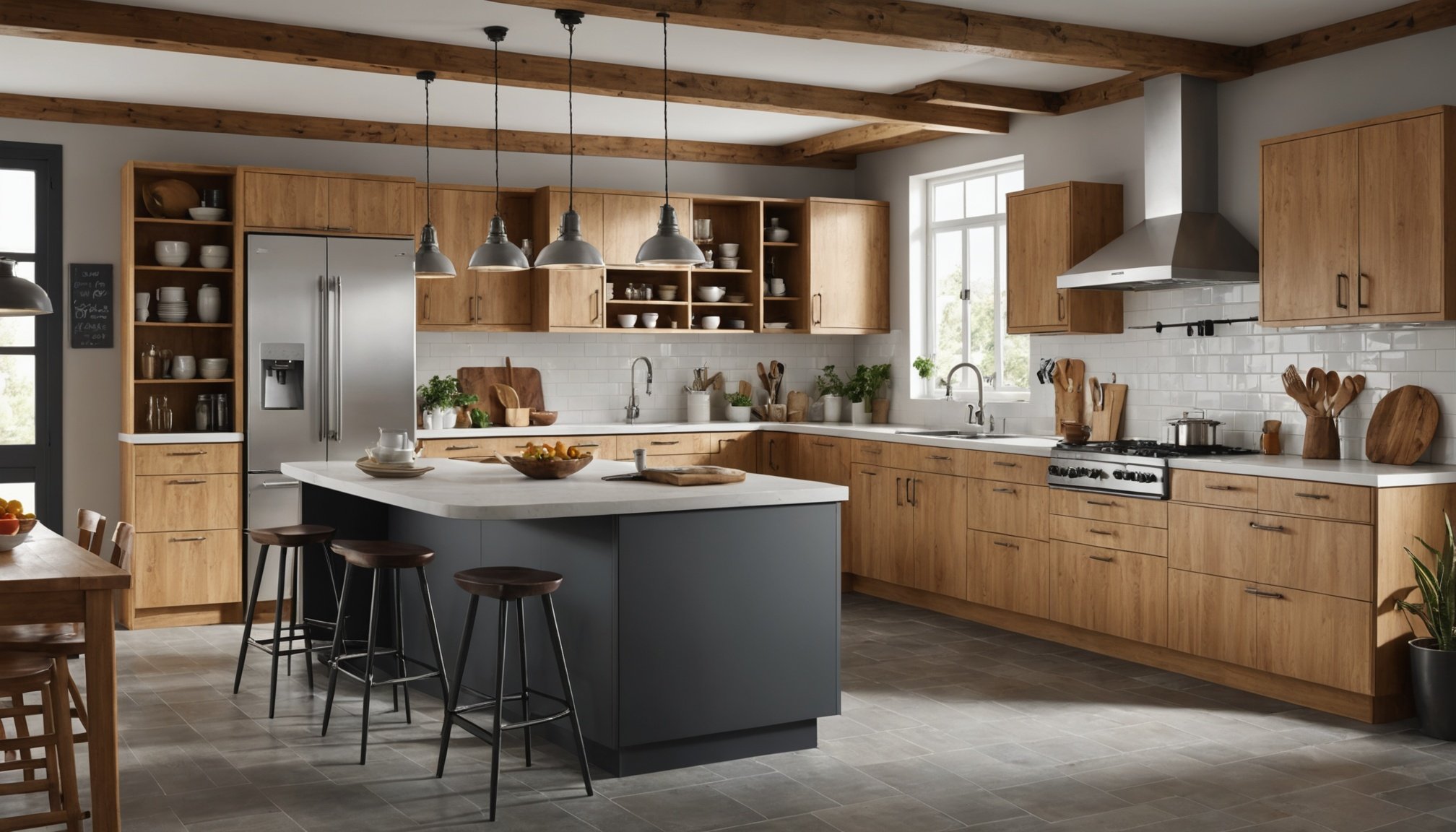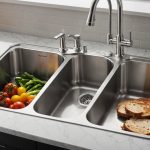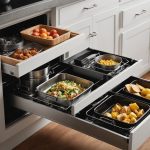Your kitchen often reflects your values. By incorporating recycled materials into your kitchen design, you not only create a stylish space but also promote sustainability. Imagine countertops made from repurposed glass or cabinets crafted from reclaimed wood. These choices reduce waste and carbon footprint while adding character to your home. Let’s explore the innovative ways recycled materials can transform your kitchen into an eco-friendly sanctuary that impresses and inspires.
Environmental Benefits of Recycled Materials in Kitchen Design
Exploring sustainability in modern kitchen design
Also to see : Creative Solutions for Concealed Kitchen Storage: Unlocking Innovative Ideas
Incorporating recycled materials into kitchen design offers numerous environmental benefits. One of the most significant advantages is the reduction of waste in landfills. By using reclaimed wood, recycled glass, or repurposed metals, we can divert substantial amounts of waste from landfills, contributing to a cleaner environment.
Lower carbon footprint is another crucial benefit. The production of new materials often involves high energy consumption and emissions. In contrast, recycled materials typically require less energy to process. This results in significant energy savings and a reduced carbon footprint, making kitchen renovations more eco-friendly.
Additional reading : Crafting the Ultimate Multi-Zone Kitchen: A Guide to Designing for Diverse Cooking Activities
Moreover, the use of recycled materials supports the conservation of natural resources. By choosing materials that have been previously used, we decrease the demand for new raw materials. This helps preserve forests, reduce mining activities, and protect ecosystems.
Key Benefits of Recycled Materials
- Waste Reduction: Less material ends up in landfills.
- Energy Efficiency: Lower energy consumption compared to new materials.
- Resource Conservation: Decreases the need for virgin resources.
The integration of sustainable practices in kitchen design not only enhances the aesthetic appeal but also aligns with the growing trend towards eco-friendly living.
Cost-Effectiveness of Using Recycled Materials
Exploring budget-friendly design solutions
When considering kitchen renovations, the cost savings associated with using recycled materials can be significant. Recycled materials often present a more budget-friendly design option compared to new materials. For instance, reclaimed wood or recycled glass may be available at a fraction of the cost of new counterparts.
Comparison of Costs
A detailed comparison reveals that while initial costs for recycled materials may sometimes be similar to new materials, the long-term savings are notable. This is due to the durability and low maintenance requirements of many recycled materials. Over time, homeowners can save on repairs and replacements, making these options more affordable.
Incentives and Rebates
Governments and organizations often offer incentives or rebates to encourage the use of sustainable materials. These financial benefits can further enhance the cost-effectiveness of choosing recycled materials.
- Initial Savings: Lower purchase costs
- Durability: Reduced maintenance expenses
- Incentives: Potential rebates for sustainable choices
Embracing budget-friendly design through recycled materials not only supports environmental goals but also provides tangible financial benefits. This approach allows homeowners to enjoy both affordable renovations and contribute positively to sustainability efforts.
Unique Aesthetic Qualities of Recycled Kitchen Materials
Discovering creative possibilities in kitchen design
Recycled kitchen materials offer a unique design opportunity that sets your kitchen apart with their diverse textures and colors. Each piece of reclaimed wood or recycled glass tells its own story, adding character and charm to your space. The aesthetic appeal of these materials lies in their ability to transform ordinary kitchens into extraordinary spaces.
Diverse Textures and Colors
The variety of textures and colors available from recycled options allows for endless creativity. Whether it's the rustic feel of reclaimed wood or the vibrant hues of recycled glass, these materials provide a distinctive look that can be tailored to any style.
Case Studies of Standout Designs
Consider the kitchen of a New York-based designer who used reclaimed wood to create a warm, inviting atmosphere. The creative kitchen design was further enhanced by custom-sourced recycled glass tiles, adding a splash of color and sophistication.
Personalization Opportunities
Recycled materials offer unparalleled personalization opportunities. Homeowners can source custom pieces, ensuring their kitchen reflects their personal taste and style. This not only enhances the aesthetic appeal but also supports sustainable living.
- Textures: Unique tactile experiences
- Colors: Endless palette options
- Personalization: Tailored to individual tastes
Embrace the unique design potential of recycled materials to create a kitchen that's both beautiful and sustainable.
Tips for Selecting and Sourcing Recycled Materials
Guidance for sustainable kitchen design
When embarking on a kitchen renovation, material selection is crucial. Choosing the right recycled materials involves considering durability, aesthetics, and environmental impact. Look for materials that not only suit your style but also align with your sustainability goals.
Key Considerations
- Durability: Ensure the materials can withstand daily use.
- Aesthetic Compatibility: Match the textures and colors to your kitchen's design.
- Environmental Certifications: Check for certifications like FSC or Green Seal to ensure eco-friendliness.
Reliable Sources
Finding reliable sources is essential for purchasing high-quality recycled kitchen materials. Consider local salvage yards, online marketplaces specializing in reclaimed products, or certified eco-friendly retailers. These sources offer a range of options that can meet both your design and sustainability needs.
Certifications to Look For
When sourcing, prioritize certifications that verify the sustainability of the products. Look for labels such as:
- FSC (Forest Stewardship Council): Ensures responsible forest management.
- Green Seal: Indicates products meet rigorous environmental standards.
- Cradle to Cradle: Focuses on safe, circular product design.
By focusing on these sourcing tips, you can make informed decisions that enhance your kitchen's sustainability. Embrace the opportunity to create a space that reflects both your personal style and commitment to the environment.
Real-Life Examples and Testimonials
Showcasing successful designs and experiences with recycled materials
Showcase of Kitchens
In recent years, numerous case studies have highlighted the successful integration of recycled materials into kitchen designs. One standout example is a modern kitchen in Portland, where the use of reclaimed wood and recycled glass created a warm and inviting space. The homeowner reported significant satisfaction, noting the unique character of the materials used.
Homeowner Testimonials
Homeowners who have embraced recycled materials often share positive experiences. Sarah, a homeowner in Austin, expressed her delight: "Using recycled materials not only made my kitchen unique but also gave me peace of mind knowing I contributed to sustainability." These testimonials emphasize the benefits of creativity and environmental responsibility.
Design Challenges and Solutions
Designing with recycled materials can present challenges, such as sourcing consistent colors or textures. However, successful designs have overcome these hurdles by employing innovative solutions. For instance, mixing different shades of reclaimed wood can enhance aesthetic appeal while maintaining a cohesive look.
- Challenges: Sourcing consistency
- Solutions: Creative blending
- Results: Unique, sustainable kitchens
These real-life examples and testimonials demonstrate the potential of recycled materials to transform kitchens into spaces that are both aesthetically pleasing and environmentally friendly.













